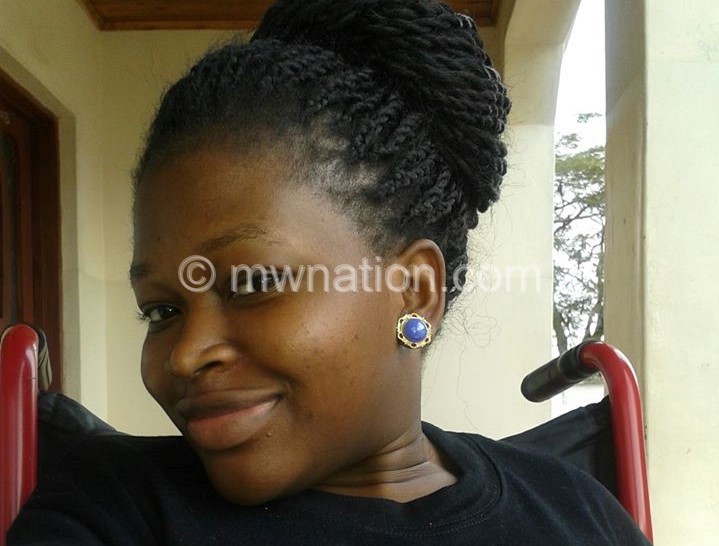Esmie Kachikuni: Fighting for other people’s rights
Where there is a will, there is a way, so the saying goes. Looking at Esmie Kachikuni’s situation, her will was there, but the way was rather hard to tread.
Nonetheless, she beat the odds of her handicap, the physical one as well as the infrastructure impediment which ordinarily should have deterred her dream of attaining education. Esmie’s struggles and efforts bore fruit eventually, but not without an inspiring tale to tell. Now she wants people in her shoes to be helped to ease their struggles. Brenda Twea spoke to Esmie:
Esmie Kachikuni, 25, from Chingila Village, Traditional Authority (T/A) Tsabango in Lilongwe started her primary school studies late because most schools could not admit her. Their argument was that she would need special care because of her disability.
She was born with a condition called Osteogenesis Imperfecta. Osteogenesis imperfecta (OI), according to www.bones.nih.gov, is a disease that causes weak bones that break easily. It is known as brittle bone disease. Sometimes the bones break for no known reason. OI can also cause many other problems such as weak muscles, brittle teeth, and hearing loss
Over time, she was accepted into one of the schools, but with mobility problems. Esmie remembers her mother carrying her to school every day because she did not have a wheelchair.
The young woman got a wheelchair when she was in Standard Six and confesses it made her life a bit easier.
As fate would have it, she was selected to Providence Girls Secondary School after sitting her Primary School Leaving Certificate (PSLC) examinations, only to find that the structures at the school were not disability friendly. Again, her mobility problems resurfaced.
“I took it upon myself to constantly approach the authorities to provide structures that were wheelchair friendly. My parents also joined me in pushing for wheelchair friendly structures. Overtime, the school administration responded and such structures were constructed. As I completed my Form Four studies, another girl on a wheelchair was selected to Providence. I am glad she didn’t have to go through the same problems I did,” she explains.
While still at school, Esmie- last born in her family- performed in drama under the Federation of Disability Organisations in Malawi (Fedoma) to sensitise fellow students to issues of disabilities.
This, she says, helped improve how fellow students related with her and others living with disabilities.
“I think one of the biggest challenges I faced was people’s failure to relate with me or help me the right way,” she says.
From Providence Secondary School, she went on to study at the University of Malawi (Unima’s) Chancellor College (Chanco) for a Bachelor of Social Sciences.
She encountered more problems at the college.
“The structures from the classrooms to hostels needed reconstructing to accommodate my needs. The major problem was accessing the library and some classes which were at times conducted on the top floors.
“Some lecturers were a bit difficult to convince that we should find a classroom that would be accessible even to us. We would sometimes start looking for a vacant classroom with friends while the lecture was in progress, and would miss half of the lesson,” she regrets.
With time, Esmie says the college administration heard her cries and those of other students with disabilities by allocating them accessible rooms.
However, her problems were still far from over. The library was still not accessible for her. When she needed books, she had to ask her friends to borrow on her behalf.
“This was difficult because books on reserve, which are usually the ones on the course outline, are on high demand and would usually be booked by the time my friends went to borrow them.
“Alternatively, I would borrow the books in the afternoon when they had been returned. However, that meant I would only use the books in between classes and that did not give me enough time. However, soft copies of certain chapters from some lecturers made things manageable,” she says.
Esmie decided to work with some law students and other students at the college, in the training of trainers on disability rights awareness at Chanco and Unima as a whole.
“Those trainings have helped in the way people treat those that are living with disabilities. They have even learnt how to offer assistance to people with disabilities. They also learnt the right words to use when describing people living with different disabilities because some can be really insulting and make us feel uncomfortable,” she explains.
Esmie was born on 14 April 1992 at Nguludi in Chiradzulu. She is the last born in a family of four and was born with an identical twin sister who passed away during their final year of college in 2016.
“We were identical, so we had the same disability. We were very close and we used to do everything together. I was very shocked about her death because we were together the day before and she was alright. She died in her sleep,” she regrets.
The young woman grew up in a Christian home. Both her parents are ministers, with her father serving as Bishop at Bwaila Living Waters Church (City of Eagles).
“I thank God for my parents. They sent me to school and they did everything they could to ensure that I got an education. I am thankful for their prayers and the encouragement they gave me when things got tough.
“They told me I could be anything i wanted, so, even when some people discouraged me, their words of encouragement got me through it,” she says.





